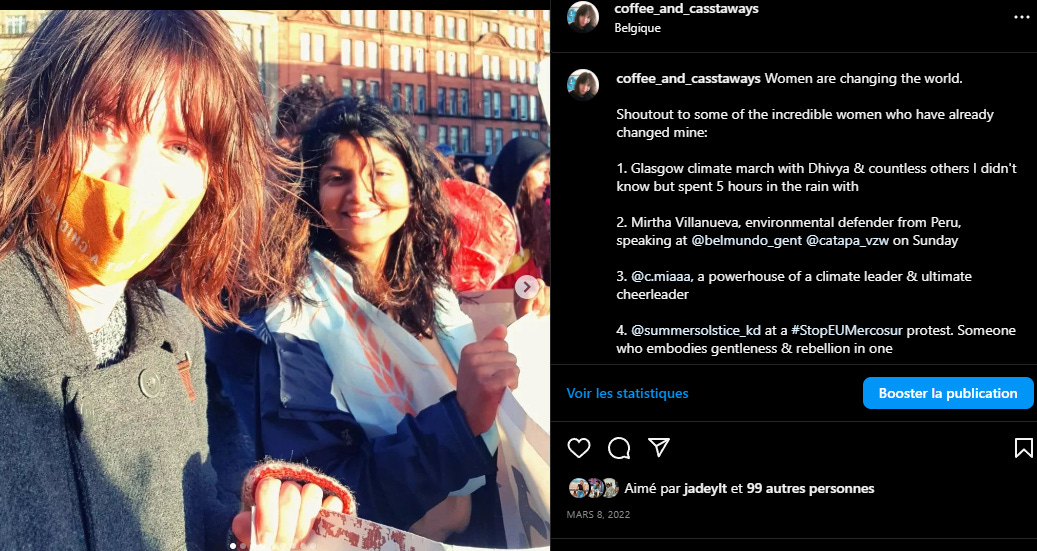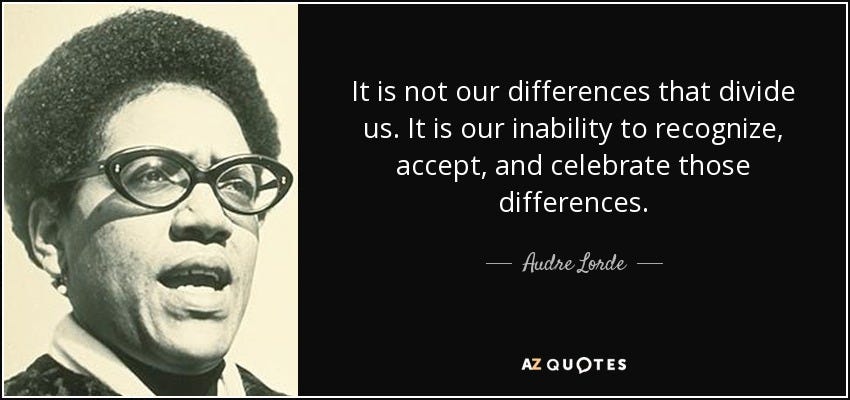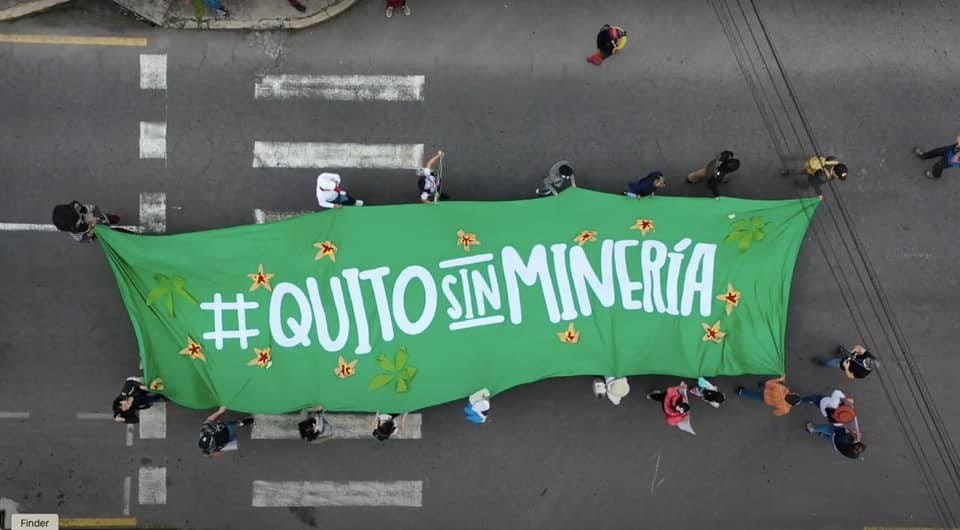"The time of being victims is over. We are leading the resistance now."
Justice and rewilding is a science. And it's also pretty damn personal.
Help keep the Green Fix running! The newsletter is volunteer-run. If you find this newsletter useful, please consider tipping a virtual coffee.
***
I am, after all, a woman. Female. Girl. Hysterical. Feisty. Melodramatic. That’s us.
A flawed one, but a woman nonetheless.
Because you have to be one, right? Man or woman. Young or old. Black or white. The world told us we live in either-or binaries. You’re with us or against us. I am me and you are you.
But it turns out that I am not me at all.
For example, I was not me the other day. Walking through the station at midnight. A group of men tried to walk beside me, tried to get me to shift my gaze from the ground. I was a thing.
Then I complained about a sexist joke and I became a Pushy Feminist.
And in my own self-narration, I am a Strong Independent Woman that takes no shit from anyone.
A few months ago I left my laptop at home and let my phone die and walked and walked hours to a green place and lay in the grass. I felt like I could take root. I was not a woman then. I was a tree.
None of these people are me. And I guess sometimes you are not you either. Perhaps once again we fell for the idea that the world abides by binaries.
I wrote this on International Women’s Day. It is a day much like yesterday and much like tomorrow. These too, are not so divided.
They said, it’s now or never for the planet.
They said, we’re either doomed or we’re not.
I say, it is not so simple.
We say, everything is getting better and everything is getting worse and these two things can be true at the same time. And we had better get comfortable with complexity quickly if we want to get anywhere closer to happiness and climate peace.
We must re-diversify our lives, our minds and our identities. We must understand that labels like man, woman, natural, human, mother, worker, child, adult were only ever meant to be the broadest generalisations, not the foundations of our politics and economics, and not all-encompassing. Liberating not limiting factors.
Rewilding is an environmental process. It is a political initiative, it is a business approach, it is a feeling. It is about filling in all the spaces between the binaries we invented. It is not personal. But it is - it is about me and you.
***
If you like this newsletter, please help me by sharing it using the button here:
What’s Going On?
How Russia’s war in Ukraine is shaping energy use in Europe.
Related: Meanwhile, liquid gas lobby groups are trying to undermine EU climate plans.1,000 super-emitting methane leaks risk triggering crucial climate tipping points.
Related: What is so bad about methane?Emissions from foods including meat and dairy enough to fail 1.5 global warming limit.
Useful: What does this study actually say and what do we do?French NGOs sue BNP Paribas for expanding fossil fuel projects.
Useful: Sign the petition to support their case.UN finally reaches agreement on protecting ocean biodiversity.
Useful: What does this treaty actually say?
Focus On: The story of anti-mining in Ecuador
Nathalia Bonilla, activist in Ecuador, explains the struggle to get exploitative mining projects out of the capital city.
I am Nathalia Bonilla, I am from Acción Ecológica in Ecuador, an activist organisation fighting to protect life and the Earth. We first worked in the Amazon basin. Now we also work in Chocó Andino and other regions. We are mainly women.
People in the [Global] South have beautiful rainforests and lots of different cultures, each one of them speaks their own language and they have their own way of living with nature. We want to defend these other ways of living [against corporate exploitation].
What brings you to Europe?
I came to bring a message. If you don’t see what’s happening, you don’t care, and you don’t act.
In Ecuador, we are experiencing an intensification of extractivism. The government is increasing the extraction of oil and minerals. This is bringing poverty and illness, people are losing their land, oil and mining companies are taking their properties.
Could you tell us about your current campaign?
I will tell you about Quito sin Minería. Near the capital city of Quito, there is the forest of “El Chocó Andino”. It is threatened by mining companies. The city of Quito depends on the water that runs through this forest for their food sovereignty and they need this land for their plantations.
So people from the rural towns are defending their lands, fighting to get these big mining companies out. But the government wants mining in the region.
We started a referendum to stop the mining projects. The consultation was taken to the constitutional court for its approval and dismissed twice before it was permitted. After that we have to legally get 190,000 signatures and present them to the National Electoral Council.
We got 400,000. The council only allowed 200,000 of them because of mining lobbying to undermine the validity of the consultation. We had to demand the votes were recounted twice. But still, we had enough.
Now the referendum is legally binding, meaning the government itself must hold a consultation on preventing mining projects in Quito. This could spark similar initiatives in other cities in Ecuador.
What does ‘Sí a la vida, no a la minería’ mean?
‘Yes to life, no to mining.’ Because mining means death.
When mining companies enter our land they destroy the forest, they contaminate the water, they destroy local cultures and local economies, they destroy the lives of women and cause illness.
I used to work with the community of Buenos Aires, in the province of Imbabura in Ecuador. This rural area in the mountains is full of copper and gold. It was given to an Australian company, but they didn’t take care of the land, so they left an empty space for illegal mining to enter. This led to violent conflicts, drugs and exploitation of local workers. The people from Buenos Aires are fighting back to get mining companies out of their land, and saying NO to all kinds of mining.
Is there an issue with racism in the anti-mining struggle?
Yes. Many of the territories affected by mining are the homes of indigenous communities and afro-descendant communities. Companies seize the resources from their lands without complying with the communities’ right to be consulted beforehand.
People in Europe should know where the oil they are consuming comes from, it comes from human right violations. The right to say no to such projects is not respected when it comes from people in the Global South.
Do you work with young people?
We work with Yasunidos, a group of young people working on the defence of the Yasuní forest. Yasuní is a national park rich in biodiversity, home of the Tagaeri and Taromenane indigenous people, living in voluntary isolation. The Yasuní forest also has oil deposits, so the government has economic interests there.
Yasunidos followed a similar approach as “Quito sin minería”, they collected signatures all over Ecuador, but this time the government rejected their consultation, arguing that the signatures were not properly collected. But Yasunidos is not stopping, they’re going to court to denounce the government’s fraud.
Is it dangerous to be an activist in Ecuador?
This week, the leader of the A'i Cofán Dureno community, Eduardo Mendúa, was killed. He was against oil extraction and he was part of one of the biggest indigenous organisations in Ecuador. We are concerned, but we try to keep moving, we feel protected inside the communities.
You say women are affected by mining, how so?
Women are impacted in many ways. Mining companies come in the territories with workers from outside. There is a lot of aggression from these men and companies leaving behind young single mothers and women forced into prostitution. The spread of alcoholism and drug abuse in turn leads to greater violence against women at home.
Women are also the ones who have to take care of the families. If they cannot fish or hunt, they have to work harder and find other ways of feeding their kids. Their bodies will suffer. At the same time, as a result of cultural changes caused by mining, the income men receive from working for these mining companies doesn’t go to their families, men keep it for themselves and use it for alcohol.
But now we’re making networks of women. We’re becoming more independent and saying no. Women don’t want to be the victims anymore, they’re leading the resistance against mining companies.
What can we in Europe do to help?
The most important thing is to know about it and use your different skills to help. If researchers want to go and make a report about it, this will work. If journalists want to write a story, this will work. If you can fundraise, or use social media, the most important thing is to start.
It might seem like a small thing to you but it may be big for us.
You can follow Acción Ecológica on Instagram @ecologicaec or Twitter @AcEcologica. You can follow the #QuitoSinMineria campaign at @quitosinmineria on Twitter and Instagram.
So Now What Do I Do?
LEARN MORE
Tune in: How to prepare for climate migration: a webinar. 16 March.
Listen: TEDxLondon talk on why gender equality is good for the climate.
TRY SOMETHING NEW
Yunus & Youth are looking for global social entrepreneurs for their 6-month fellowship. Deadline 12 March.
The One World Fellowship is open for young film-makers aspiring to report on stories from the Global South. Apply before 22 March.
Apply to join Generation Climate Europe as volunteer Alumni Lead.
CHANGE THE SYSTEM
[UK] The UK Youth Climate Coalition are recruiting youth activists until the 19 March!
Take 30 seconds to sign the Good Clothes Fair Pay petition to ensure garment workers a living wage.
Register to attend the EU Beyond Growth Conference, taking place 15-17 May!
Join our afterwork!
24th March, Bambino Central, the party kicks off at 19h. See you there?
By the way…
The Green Fix is now offering low-cost sponsored slots on the newsletter. Book your slot by emailing casshebron@gmail.com
If you have a topic you want the Green Fix to cover, fill out this feedback form & tell us your idea!
Stay in the loop
You can also follow the Green Fix Twitter and LinkedIn page here for more climate opportunities. You can also connect with me on Instagram, Twitter and LinkedIn.
Know someone interested in environmental issues? Forward this email to them - we want to reach people who care about doing more for the planet, with your help.










